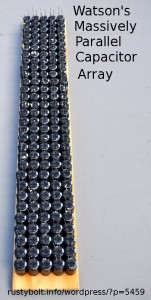 I finished gluing the 10 000 uF capacitors down to a piece of wood. I now have a Massively Parallel Capacitor Array (MPCA) Now the hard part comes: connecting all 150 of them up in parallel.
I finished gluing the 10 000 uF capacitors down to a piece of wood. I now have a Massively Parallel Capacitor Array (MPCA) Now the hard part comes: connecting all 150 of them up in parallel.
I bought a whole box of 250 electrolytic capacitors on tape and fan folded. They were only ten dollars US from Goldmine-Elec.com. I sure wasn’t going to be able to use all of them up in various projects in my lifetime, so I had to have something to use most of them up. I got a piece of 3/8 inch plywood 4 inches wide by 24 inches long, and marked some rows out in pencil so I knew where the caps were to be placed. Most of the day and a tube of silicone seal later, I had them in place and ready to dry overnight – see the photo.
Now the hard part comes: connecting them together with some heavier gauge wire. I think bare wire would be easier to work with. I’m still wondering about overcurrent protection. Should I put a fuse on each long row, or will a single fuse for the whole array be sufficient? How much current should the fuse handle? This array adds up to a lot of capacitance, a total of 1.5 farads. And at ten volts, that could be a lot of current if it was shorted. I don’t plan on charging it quickly; maybe over the day with a solar cell. Then get it to light LEDs at night. But I got to figure out how I want the array energy to be converted and used. Should I just use analog parts, like regulator chips? Or should I treat it like a variable voltage source, and let a buck-boost DC-DC converter change the array’s output to a fixed voltage?
Lots of questions that I need to investigate and answer. I have a bunch of Maxwell 2600 Farad, 2.5 volt ultracapacitors, and those have so much energy that I can treat them like a voltage source and just connect a Joule Thief to them and run the LEDs from that. I also bought some DC-DC converters on eBay, each is capable of taking in unregulated voltages and putting out a steady voltage. They’re very efficient and barely get warm. I may be able to use one of these on the MPCA to stabilize its output.
I started out with a box of 250 caps, on fan folded tape. Now, after using up 150 on the MPCA, I still have nearly 100 caps left. If I had a smaller piece of wood, I could wire up more of them – maybe 50 more – in another array. Then I could bring the total to 2 Farads. Maybe I’ll get to that later.
Update – The weekend before New Years Eve – I took apart some multiconductor foil shielded cable and salvaged the bare stranded wire from it. I think it was about 22 AWG, and I used it all up – about ten feet – to wire up the MPCA. I still wasn’t finished so I had to strip off some other wire to get more bare stranded wire to finish. Now that all the hard work is done and I have all of them wired up, all I have to do is mount a terminal strip on the MPCA board and wire them all to the terminal strip. Wow. I can’t believe it’s nearly done. When I started, I thought it was going to be a daunting task. It took time and patience, but nothing that posed a technological challenge.
Back to working on the MPCA…











